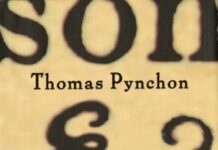
Ebook Info
- Published: 2012
- Number of pages: 770 pages
- Format: EPUB
- File Size: 1.16 MB
- Authors: Thomas Pynchon
Description
Winner of the 1974 National Book Award “A screaming comes across the sky. . .” A few months after the Germans’ secret V-2 rocket bombs begin falling on London, British Intelligence discovers that a map of the city pinpointing the sexual conquests of one Lieutenant Tyrone Slothrop, U.S. Army, corresponds identically to a map showing the V-2 impact sites. The implications of this discovery will launch Slothrop on an amazing journey across war-torn Europe, fleeing an international cabal of military-industrial superpowers, in search of the mysterious Rocket 00000, through a wildly comic extravaganza that has been hailed in The New Republic as “the most profound and accomplished American novel since the end of World War II.”
User’s Reviews
Reviews from Amazon users which were colected at the time this book was published on the website:
⭐For some insane reason, I decided about three months ago to re-read ‘Gravity’s Rainbow,’ after having read it a couple of decades ago and finding it maddening, frustrating, yet strangely alluring.Upon a second, and more careful, reading, I feel I may understand the book slightly better, but there are still countless passages that leave me baffled, unmoved, or both.I think I perceive what Pynchon is trying to tell us regarding the madness of humanity and the insanity of war. But that message is clotted and confused and muddled by his inability to keep his own genius in check. As with my first reading, I relied upon Weisenburger’s “Gravity’s Rainbow Companion” to help understand the numberless references Pynchon evidently had banging around his brain — the Kabbala, movies of the ’30s and ’40s, astrology (groan), chemistry, “rocket science” and so on.Honestly, I think Vonnegut did a much better job of exploring the moral questions (presumably) at the heart of Pynchon’s opus. I’d somehow failed to read “Mother Night” until I needed something to cleanse my palate from GR each night, and man, that is one tight, powerful little novel; better, I think, than even “Slaughterhouse-Five,” which is also superior to GR, in my opinion.Certain well-known passages (i.e. “Byron the Bulb”) are widely regarded by average readers (if not self-proclaimed geniuses who “get it” all) as superfluous and ultimately meaningless. In my opinion, as much as half the book might be considered pointless, and as Weisenburger frequently notes (without using this contemporary language), I honestly think Pynchon was “trolling” or “punking” all us suckers willing to buy the book and take the time to plow through it.Yes, I know: I’m just too dim to understand the genius. But even Weisenburger acknowledges that many of his (and others’) strenuous efforts to make it all make sense, to make it fit, may be a fool’s errand, and that the author may have fully intended it that way. ‘Gravity’s Rainbow’ may be, in part, an elaborate practical joke.For me, the most effective parts of the novel are the first 200 pages, which so effectively set the reader’s mind for what’s to come, as well as the surprisingly narrative later sections that — the horror, the horror — actually propel the plot (such as it is) forward, and other occasionally pellucid passages (the story of Franz and “Ilse” Pokler, for example).Unpleasantly, the passages I most clearly remembered from the previous reading — Pudding’s predilections, Slothrop’s toilet journey, the “Berlin-Rome axis” and poor Gottfried, and the like — remain offputting. Again, I can’t help but wonder if Pynchon wasn’t feeding us all the worst stuff he could come up with, just to see if we bought it — or better yet, pretended that it was profound.I’m an atheist and, generally speaking, look askance at pious moralism. But I have to say, when I step back and look at “Gravity’s Rainbow,” I start to understand why some Pulitzer judges just couldn’t bring themselves to give the prize to what is, I think, fundamentally an amoral book. Not in some prudish sense, but rather, in the novel’s pervasive surrender to hopelessness (sorry, Roger and Jessica). Pynchon seems to find meaning in conspiracy, but I don’t.For all that, I’m glad I read it again. I can’t imagine I’ll come back to it again before I breath my last; with luck, that particular compulsion is no more.Should you read it? If you love post-modern fiction, by all means. If you want to impress people, sure. For enjoyment? Hey, some reviewers here seem to adore it.Now, everybody….
⭐I love reading, and maybe there’s something to this book that I’m missing…but I’ve tried reading it several times and hated it. I got to the part with the guy obsessed with bananas… maybe 50-70 pages in. It’s dull. And written in a very stylized manner that I’m sure you just absolutely love if you love it. I don’t. It’s also extremely masculine. I get it; it’s war. But I love and enjoy Hemingway and Steinbeck and other masculine (even verging on misogynistic, Hemingway) writers who write about war and change and hardship. This…not so much.
⭐This book is really fun and funny, just don’t worry about it making any lineal since
⭐Gravity’s Rainbow is one of the greatest works of fiction in the history of mankind, ranking with the best of James Joyce, Franz Kafka, William Faulkner, Mark Twain, Leo Tolstoy, Jane Austen, Herman Melville, William Shakespeare, Guy De Maupassant, and Henry James. Against the backdrop of World War II, Thomas Pynchon depicts the madness of paranoia, which has become a post modern religion for many who seek meaning in a meaningless, cruel world. This theme of paranoia is juxtaposed to a parallel theme of entropy (i.e, randomness). Gravity’s Rainbow is a dark, difficult work of art that is an insightful commentary on the loss of purpose and faith that so shattered the West and especially Europe after the two great wars and the great depression. (Note the lack of scientific, political or cultural contributions by Europe after World War II in light of the parade of giants like Beethoven, Einstein, Queen Elizabeth, Descartes, Galileo, Picasso, Newton, Gothic architecture, Shakespeare, and Michelangelo, to cite just few of the many flowers from Europe). The writing in Gravity’s Rainbow is vivid, constantly metaphorical (always a sign of genius), and tense.
⭐From the first lines this total and utter mindfuck had me gripped. Didn’t understand large portions of it, but was thoroughly in awe of Pynchon’s genius. I found it’s best to sit down and read without searching for the meaning in every obscure reference (at least the first reading). There’s just too much. It’s too dense and confusing. But there was an unmistakable joy I got from the delightfully transgressive vignettes woven throughout. Very difficult to describe. Harder to recommend. If you’re into weird, long, at times incomprehensible, maybe fun, definitely funny books; give it a shot.
⭐I consider myself an open minded reader, a person of varying tastes and a patience to learn or understand different approaches to the art of literature.But this book? Oh my days, could you say anymore words and manage to get nowhere with a narrative.90 pages in and I barely understood what was going on, no narrative flow and too much filler. Was this man drunk or high when he wrote this? Were the reviewers also somewhat inebriated? Surely bothNot for me, probably not for you either. As another Amazon review said – Painful.
⭐Pynchon is one of my favourite writers. The guy is a genius in terms of prose, imagination and originality, But Gravity’s Rainbow is a mess structurally. It famously has around 400 characters – many of whom you’ll forget immediately and only a handful of whom have any kind of genuine personality. Some of them are mentioned once and never again. Some appear for a page or two in stories that have no connection to anything else,. Even the “main” characters originally appear without context and switch between scenes abruptly.My problem with Pynchon is that his creativity explodes on the page without order. There are connective themes, but the narrative is chopped up and shuffled as if he’s writing whatever occurs to him in the moment. This, for me, isn’t postmodernism or modernism. It’s a lack of narrative control.Some reviewers have said that you have to approach the book without any ideas of what literature has been before – almost as if it isn’t a book. They say it’s more like a movie or a TV series. But it IS a book. You have to turn the pages and follow what happens. If the narrative lapses into something totally irrelevant for twenty pages that you don’t understand and which seems to have no context, and which will probably never be referred to again, you have to read it anyway. Or skip it. You can pretty much skip 20-30 pages at a time and it won’t make any difference.In fact, Pynchon adds a paragraph in the last section of the book in which he tells us how to read it. Essentially, we have to go with the flow and keep on reading even if it seems we’ve gone way off track. Everything will come right in the end. That’s the promise. And it does become easier in the final part. But getting there is a matter of bloody-mindedness. You read just to read.Pynchon could have been just as brilliant but more readable. There are sections of this book that are astoundingly inventive, but you have to wade through scores of pages where you haven’t got any idea what’s happening. You feel like you’re reading a different book. At some point, you stop caring. You lose faith.In later works such as “Inherent Vice” and “Bleeding Edge,” Pynchon uses the same conspiracy narrative games but remains readable. Gravity’s Rainbow is so famously unreadable not because the ideas or language are difficult, but because Pynchon refuses to accept any of the norms of conventional novelistic narrative. It’s as if someone has edited together twenty great films in random order – great individual scenes, but not a movie.Pynchon remains a niche author for this reason. He could have been one of the true greats. Funnier than Vonnegut. As descriptive as McCarthy. More outrageous than Nabokov. But so, so infuriating to read. I appreciate his books as works of art, but I can’t say I enjoy them. It’s a pity.
⭐This book is unreadable.Author’s writing style is bad.As George Orwell states in his magnificent book WHY I WRITE, author of this book is suffering of SHEER EGOISM; but not a healthy one,one that makes a show for others by creating a tasteless, styleless, incomprehensible narration.I could only stand until page 15; I respect all those who managed to finish the book, and on top of it, enjoyed it.
⭐The book has merit for the beauty of the prose and can be enjoyed like Finnegan’s Wake. On the down side: the pornography content seems gratuitous and the surrealism seems very dated. The novel by Philip K Dick from 20 years earlier supplied all the good parts of the plot. Pynchon’s blatant plagiarism is rather shameless. Definitely not a masterpiece but I do love the prose.
⭐Am re-reading this many years after it came out. This is so well written compared with much fiction. It still seems fresh even now. I had also wondered why the “dive into the toilet” scene in Trainspotting was very familiar – now I remember – an extraordinarily similar scene is described in this novel written many years prior to the film.
Keywords
Free Download Gravity’s Rainbow (Classic, 20th-Century, Penguin) in EPUB format
Gravity’s Rainbow (Classic, 20th-Century, Penguin) EPUB Free Download
Download Gravity’s Rainbow (Classic, 20th-Century, Penguin) 2012 EPUB Free
Gravity’s Rainbow (Classic, 20th-Century, Penguin) 2012 EPUB Free Download
Download Gravity’s Rainbow (Classic, 20th-Century, Penguin) EPUB
Free Download Ebook Gravity’s Rainbow (Classic, 20th-Century, Penguin)



